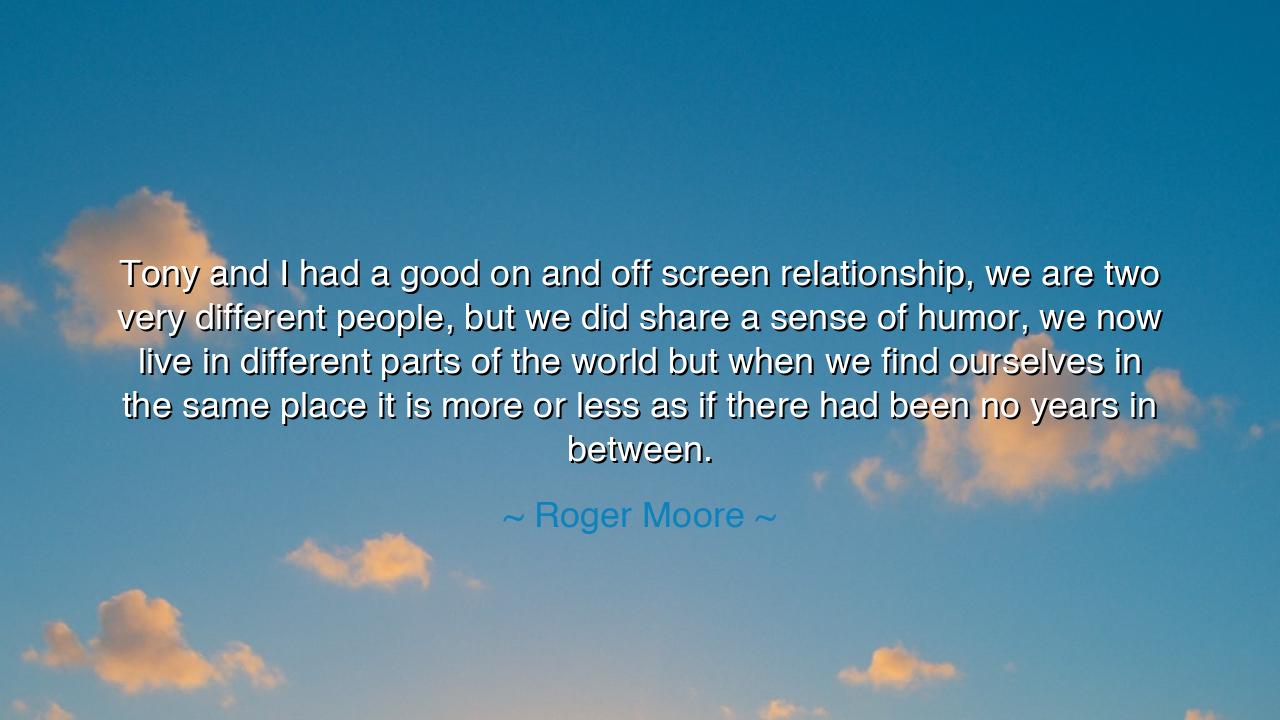
Tony and I had a good on and off screen relationship, we are two
Tony and I had a good on and off screen relationship, we are two very different people, but we did share a sense of humor, we now live in different parts of the world but when we find ourselves in the same place it is more or less as if there had been no years in between.






The great actor Roger Moore, known for his grace, humor, and gentlemanly wisdom, once said: “Tony and I had a good on and off screen relationship, we are two very different people, but we did share a sense of humor, we now live in different parts of the world but when we find ourselves in the same place it is more or less as if there had been no years in between.” These words, though simple, hold the timeless power of truth — they speak of friendship, of the rare bond that transcends time and distance, and of the unbreakable thread of shared laughter. Moore’s reflection is not merely about camaraderie between actors; it is a hymn to the enduring nature of connection forged through understanding and joy.
In speaking of Tony, Moore referred to his friend and co-star Tony Curtis, with whom he shared the screen in the 1970s television series The Persuaders!. The two men, different in background and temperament — Moore, the poised Englishman; Curtis, the fiery American — found common ground in humor. Their friendship was a meeting of contrasts, an alchemy of wit and warmth that transcended the artifice of performance. The laughter they shared became their bridge — an unspoken language through which two distinct spirits found harmony. In this, Moore reminds us that difference does not divide true friends; rather, it enriches the bond, so long as there is laughter to soften the edges of contrast.
When he says, “we now live in different parts of the world but when we find ourselves in the same place it is as if there had been no years in between,” Moore captures the miracle of lasting friendship. True companionship defies the laws of time — it does not wither with absence nor fade with silence. Such bonds are rooted not in constant presence, but in shared spirit. When two people have once laughed together with honesty, their souls recognize one another forever. Time may scatter them across the world, but laughter remembers — it keeps the flame of friendship alive through all distances. It is the invisible thread that ties yesterday to today.
The ancients understood this sacred truth. Aristotle wrote that friendship is “one soul dwelling in two bodies,” and Moore’s reflection is the living echo of that idea. In their shared humor, he and Curtis found the unity of spirit that philosophers once praised as divine. Laughter is not trivial; it is communion. It dissolves pride, erases borders, and reminds us of our shared humanity. When Moore recalls their laughter, he is not speaking of jokes — he is speaking of the kind of humor that reveals the heart, the kind that transforms difference into kinship.
Consider, too, the story of Cicero and Atticus, two friends separated for years by war and exile in ancient Rome. In their letters to one another, they spoke not only of politics and philosophy, but of shared jokes, small joys, and the longing for familiar laughter. When they were finally reunited, Cicero wrote, “It was as if no day had passed.” That is the same magic Roger Moore describes — the eternal present of friendship. For those bound by shared humor and affection, time cannot create distance; it merely pauses the conversation.
Moore’s words carry another quiet wisdom — the acknowledgment of differences without division. He and Curtis were, as he says, “two very different people.” Yet instead of allowing those differences to create walls, they allowed laughter to open doors. In an age where difference often divides, his example teaches us that the highest form of friendship is not sameness, but acceptance, woven with joy. Humor becomes the philosopher’s stone of human relationships — turning friction into warmth, contrast into light.
The lesson, then, is both gentle and profound: cherish the friendships built on laughter. Do not fear distance or time, for laughter remembers what the years forget. Reach out to those who once made your spirit light, even if decades have passed; when you speak again, you will find that true connection sleeps, but never dies. Let your humor bridge your differences, and let your joy keep you human.
And so, remember Roger Moore’s wisdom: friendship sustained by laughter is timeless. It does not need constant tending, nor grand gestures; it lives quietly in the heart, waiting for the moment of reunion to rise again, fresh as morning. For laughter, when shared in sincerity, belongs not to a moment but to eternity. As long as two souls can meet again and smile as though no years have passed, they have found the rarest treasure life can give — the gift of a friendship that defeats time itself.






AAdministratorAdministrator
Welcome, honored guests. Please leave a comment, we will respond soon